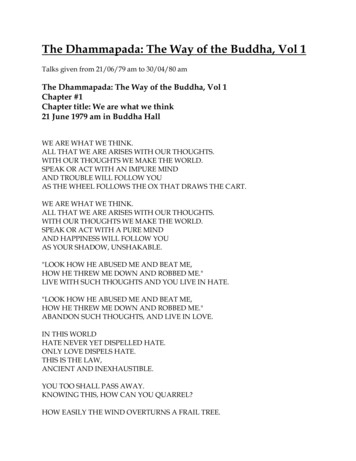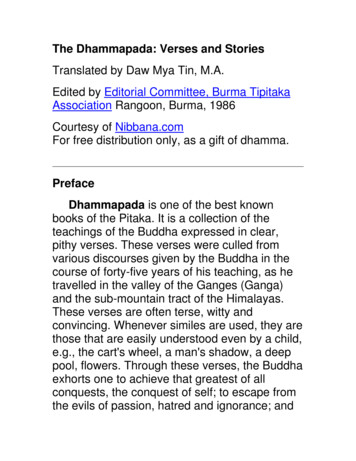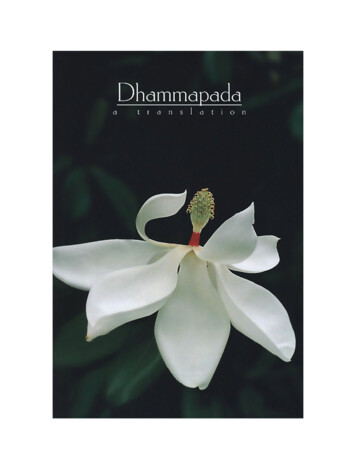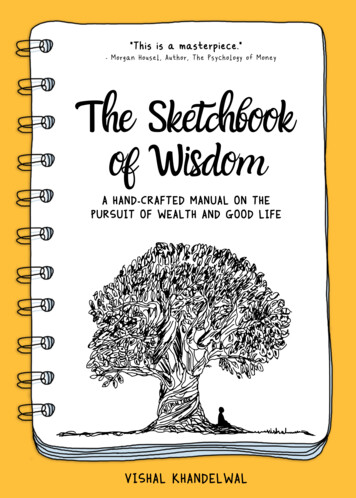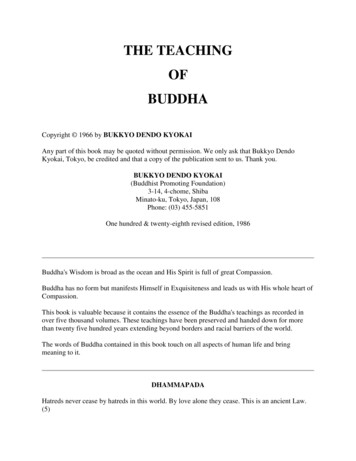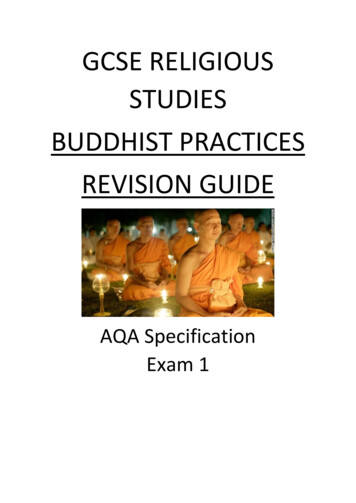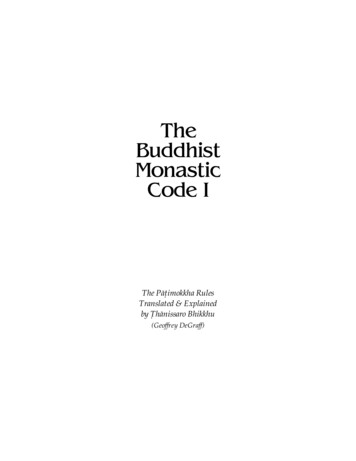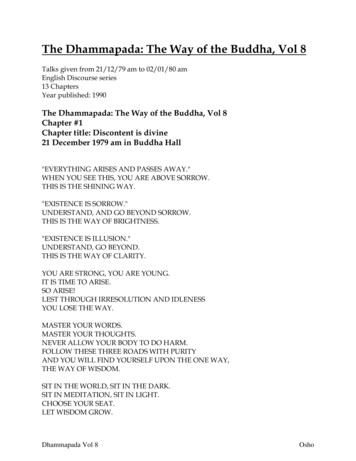
Transcription
The Dhammapada: The Way of the Buddha, Vol 8Talks given from 21/12/79 am to 02/01/80 amEnglish Discourse series13 ChaptersYear published: 1990The Dhammapada: The Way of the Buddha, Vol 8Chapter #1Chapter title: Discontent is divine21 December 1979 am in Buddha Hall"EVERYTHING ARISES AND PASSES AWAY."WHEN YOU SEE THIS, YOU ARE ABOVE SORROW.THIS IS THE SHINING WAY."EXISTENCE IS SORROW."UNDERSTAND, AND GO BEYOND SORROW.THIS IS THE WAY OF BRIGHTNESS."EXISTENCE IS ILLUSION."UNDERSTAND, GO BEYOND.THIS IS THE WAY OF CLARITY.YOU ARE STRONG, YOU ARE YOUNG.IT IS TIME TO ARISE.SO ARISE!LEST THROUGH IRRESOLUTION AND IDLENESSYOU LOSE THE WAY.MASTER YOUR WORDS.MASTER YOUR THOUGHTS.NEVER ALLOW YOUR BODY TO DO HARM.FOLLOW THESE THREE ROADS WITH PURITYAND YOU WILL FIND YOURSELF UPON THE ONE WAY,THE WAY OF WISDOM.SIT IN THE WORLD, SIT IN THE DARK.SIT IN MEDITATION, SIT IN LIGHT.CHOOSE YOUR SEAT.LET WISDOM GROW.Dhammapada Vol 8Osho
CUT DOWN THE FOREST,NOT THE TREE.FOR OUT OF THE FOREST COMES DANGER.CUT DOWN THE FOREST.FELL DESIRE.AND SET YOURSELF FREE.The way of Gautama the Buddha is the way of intelligence, understanding, awareness,meditation. It is not the way of belief; it is the way of seeing the truth itself. Beliefsimply covers up your ignorance; it does not deliver you from ignorance. Belief is adeception you play upon yourself; it is not transformation.And the people who think themselves religious are only believers, not religious. Theyhave no clarity, no understanding, no insight into the nature of things. They don't knowwhat they are doing, they don't know what they are thinking. They are simplyrepeating conventions, traditions; dead words spoken long long ago. They cannot becertain whether those words are true or not. Nobody can be certain unless one realizesoneself.There is only one certainty in existence and that is your own realization, your ownseeing. Unless that happens, don't become contented; remain discontented.Discontentment is divine; contentment through beliefs is stupid. It is through divinediscontent that one grows, but it is the path which is arduous. The path of belief issimple, convenient, comfortable. You need not do anything. You have only to say yes tothe authorities: the authorities of the church, of the state. You have simply to be a slaveto people who are in power.But to follow the path of Buddha one has to be a rebel. Rebellion is its essential taste; itis only for the rebellious spirit. But only rebellious people have spirits, only they havesouls. Others are hollow, empty.These sutras of today are of immense beauty, truth. Meditate over them. The first sutra:"EVERYTHING ARISES AND PASSES AWAY."WHEN YOU SEE THIS, YOU ARE ABOVE SORROW.THIS IS THE SHINING WAY.Life is a flux, nothing abides. Still we are such fools, we go on clinging. If change is thenature of life, then clinging is stupidity, because your clinging is not going to change thelaw of life. Your clinging is only going to make you miserable. Things are bound tochange; whether you cling or not does not matter. If you cling you become miserable:you cling and they change, you feel frustrated. If you don't cling they still change, butthen there is no frustration because you were perfectly aware that they are bound tochange. This is how things are, this is the suchness of life.Dhammapada Vol 8Osho
Remember Haldane's Law that the universe is not only queerer than we imagine, it isqueerer than we CAN imagine. And remember, you are not alone. The world really islike this.It is a very strange world. Everything is momentary, yet every momentary thing givesyou the illusion of being permanent. Everything is just a soap bubble, shiningbeautifully in the sunrays, maybe surrounded by a rainbow, a beautiful aura of light -but a soap bubble is a soap bubble! Any moment and it will be gone and gone forever.But for the moment it can deceive you.And the strangest thing is that thousands of times you have been deceived, yet youdon't become aware. Again another soap bubble and you will believe. Yourunintelligence seems to be unlimited! How many times do you need to be hammered?How many times do your dreams have to be crushed and shattered? How many timeshas life to prove that clinging is nonsense? Stop clinging and then you go beyondsorrow. It is clinging that is the root cause of sorrow.The world is dominated by two types of people: those who understand what they donot manage, and those who manage what they do not understand. Just watch your ownlife and you will see it happening within your mind too. You understand things whichyou don't manage; it is easy to understand things which you don't manage.Somebody asked George Bernard Shaw, "Do you believe that nothing is impossible?"Bernard Shaw is reported to have said, "Yes, I DO believe that nothing is impossible,provided somebody else is going to do it."It is easy to understand what you don't manage. What YOU manage you don'tunderstand at all. Do you understand your life? You understand about God and youdon't understand about your life energy. You understand about heaven and hell. Thereare people who know how many heavens there are and how many hells.One man came to me and he said, "In our religion we believe that there are fourteenheavens. Mahavira has reached only up to the fifth; Buddha up to the sixth; Jesus,Mohammed, etcetera, only up to the fourth; Kabir, Nanak, up to the seventh. And myguru," the man said -- he belonged to the Radhaswami sect -- "MY guru has reached tothe fourteenth."I said to the man, "Yes, I know. I have seen him in the fourteenth, because I havereached to the fifteenth. I am acquainted with the guy."He said, "Fifteenth? But in our scriptures there are only fourteen heavens, not fifteen."I said, "How can there be fifteen in your scriptures? -- because your teacher has reachedonly up to the fourteenth!"Foolish people! But they go on knowing how many heavens there are and how manyhells there are. Jainas believe in seven hells. They have thrown Krishna into the seventhbecause he was the cause of the great war, Mahabharata. He persuaded Arjuna, hisdisciple, to fight and kill people. He was the cause of great violence so they havethrown him to the seventh, into the last. But in the days of Mahavira, one of theDhammapada Vol 8Osho
disciples of Mahavira, Makkhali Gosal, revolted against the master and declared thatthere are not seven hells but seven hundred.People go on talking nonsense -- seven and seven hundred -- and they are not awareabout their own inner life, from where this breath comes, to where this breath goes.They are not aware of the closest truth of their being, and they go on talking aboutultimate things. These talks about ultimate things are simply to avoid real problems oflife. These are strategies of the mind to keep you occupied with utter nonsense. Bewareof the mind and its cunning ways!Buddha says: "EVERYTHING ARISES AND PASSES AWAY." WHEN YOU SEE THIS.He is not saying, "Believe this." He is not saying, "I have become the enlightened one, sowhatsoever I say you have to believe in it." He is not saying, "Because scriptures are inmy favor you have to believe me." He is not saying, "Because I can prove it logically youhave to believe in me."See the beauty of the man. He says: WHEN YOU SEE THIS, YOU ARE ABOVESORROW. In that very moment when you have seen this -- that everything ismomentary and everything is a flux and everything is BOUND to change. Dowhatsoever you want to do, but nothing is going to become permanent in this life.When you have seen this with your own eyes, and you have understood it throughyour own intelligence, suddenly you are beyond sorrow.What happens? A great revolution happens in that seeing; that very seeing is therevolution. Then you don't cling. The moment you see that this is a soap bubble youdon't cling to it. In fact, clinging to it will force it to burst sooner; if you don't cling to it,it may remain there dancing in the wind for a while. The nonclinger can enjoy life; theclinger cannot enjoy life.Gussie had lived a good life, having been married four times. Now she stood before thePearly Gates.Father Abraham said to her, "I notice that you first married a banker, then an actor, nexta rabbi, and lastly an undertaker. What kind of a system is that for a respectable Jewishwoman?""A very good system," replied Gussie. "One for the money, two for the show, three tomake ready and four to go!"If you see, you can enjoy; then it is just a game. Then everything is totally different; thenit is a big drama. Then the whole earth becomes just a stage and everybody is acting hispart. But if you don't see, you become obsessed; you start clinging to things, and deepdown you know that they are slipping out of your hands."I had everything a man could want," moaned a sad-eyed friend of ours. "Money, ahandsome home, the love of a beautiful and wealthy woman. Then, bang! One morningmy wife walked in!"Dhammapada Vol 8Osho
You can't remain in the same state for long. Life changes just like dreams. Hence themystics have been calling life nothing but a dream; a dream seen with open eyes, adream shared by others too. In the night the dream is private; nobody can share it. Inthe day the dream is public; everybody can share it. In the night the dream is subjective;in the day the dream is objective. But the quality of both is the same -- writings onwater. You have not even finished writing and they start disappearing. Not evenwritings on the sand. because on the sand the writing may stay a little longer. It willhave to wait for the wind to come or somebody to walk over it. It is writing in water.You go on writing and it goes on disappearing.Seeing it, YOU ARE ABOVE SORROW -- immediately. Then nothing else has to bedone. The moment you have seen it, where is sorrow? The cause has disappeared; youhave removed the very cause. You cling and you create the cause. Nonclinging isliberation.Hence Buddha says: THIS IS THE SHINING WAY -- so simple, so luminous, that unlessyou are utterly blind, spiritually blind, you can't miss it. He is not talking about greatmetaphysical truths. He is not philosophizing. He is not using complex words andsystems and theories. He is simply stating a fact that he has seen -- and YOU can see it.It has nothing to do with Buddha, it is not his invention, it is not his idea. It is thefacticity of life.Look around. Everything is changing. It is like a river moving and moving -- and youwant to catch hold of it? It is mercury! If you try to catch hold of it you will lose soonerthan before. Don't try to catch hold of it. Watch joyfully, silently. Witness the game, thedream. and YOU ARE ABOVE SORROW. Buddha is not saying you will GO beyondsorrow. He says, YOU are ABOVE SORROW."EXISTENCE IS SORROW."UNDERSTAND, AND GO BEYOND SORROW.THIS IS THE WAY OF BRIGHTNESS."EXISTENCE IS SORROW." First he says: Sorrow arises out of clinging to momentarythings which you cannot make permanent. It is not in the nature of things. It is againstthe universal law. It is against dhamma, it is against tao. You cannot win. If you fightwith the universal law you are fighting a losing battle; you will simply waste yourenergies. What is going to happen is bound to happen; nothing can be done about it.All that you can do is about your consciousness. You can change your vision. You cansee things in a different light, with a different context, in a new space, but you cannotchange things. If you think of the world as very real you will suffer; if you see the worldas a strange dream you will not suffer. If you think in terms of static entities you willsuffer. If you think in terms of nouns you will suffer. But if you think in terms of verbsyou will not suffer.Nouns don't exist; they exist only in languages. In reality there are no nouns.Everything is a verb because everything is changing and everything is in a process. It isnever static, it is always dynamic.Dhammapada Vol 8Osho
The second thing Buddha says is: "EXISTENCE IS SORROW." To be is sorrow. The egois sorrow. First he says: See the world as dream, fluctuating, changing, moment tomoment new. Enjoy it, enjoy its newness, enjoy all the surprises that it brings. It isbeautiful that it is changing, nothing is wrong about it; just don't cling to it. Why do youcling? You cling because you have another fallacy: that YOU are.The first fallacy is that things are static. And the second fallacy is that YOU are, that youhave a static ego. They both go together. If you want to cling you need a clinger; if youhave no need to cling, there is no need for a clinger. Go deep into it. If you don't need tocling, the ego is not needed at all, it will be pointless. In fact, it cannot exist withoutclinging.The dancer can exist only if he dances. If the dance disappears, where is the dancer? Thesinger exists only in singing. The walker exists only in walking. So is the ego: the egoexists only in clinging, in possessing things, in dominating things. When there is nodomination, no desire to dominate, no desire to cling, no desire to possess, the egostarts evaporating. On the outside you start clinging and in the inside a new claritystarts arising. The ego with all its smoke disappears, the ego with all its cloudsdisappears. It can't exist because it cannot be nourished anymore. For it to exist it has tocling. It has to create "my" and "mine," and it goes on creating "my" and "mine" in everypossible and impossible way.The ego says, "This is MY country," as if you have brought it with your birth, as if theearth is really divided into countries. The earth is undivided, it is one. But the ego says,"This is MY country" -- and not only that this is my country, "this is the greatest countryin the world. This is the holiest land."Ask the Indians. "This is the most spiritual country in the world. Everybody else ismaterialist and we are spiritualists." And everybody else has his own ideas. They aregreat. Ask the Germans. Nobody is of pure blood, only they are -- Aryan blood, Nordicblood, purest blood. God has created them to rule the whole world. And ask theJapanese. They have descended from the sun god directly; they are not ordinarymortals. The sun is their source, and the sun is the source of all life. And you askanybody. Everybody has his own ideas how HIS country is great, how HIS religion isgreat. Religion also becomes your possession: "MY religion, MY Christianity, MYHinduism."Who can claim religion? Who can claim that religion is a possession? You can bereligious, but you cannot claim that Christianity is yours, you cannot claim thatHinduism is yours. But the ego is so stupid! It goes on claiming all kinds of things.Mr. Ginsberg came home one day from the garment district where he owned acompany and said that he must get a mistress."Why?" gasped Mrs. Ginsberg."Well," replied her husband, "all the owners have them and it looks bad for my businessthat I don't.""Well, if it is for business, alright," said Mrs. Ginsberg.Dhammapada Vol 8Osho
Sometime later Mr. and Mrs. Ginsberg were enjoying an evening at the opera whensuddenly Mr. Ginsberg said, "Look, Miriam, there is Mr. Pincus and his mistress sittingacross from us in a box."Mrs. Ginsberg studied the pair for a long time with her opera glasses and then said,"Ours is better!"Anything and everything will be claimed by the ego. And "ours is always better,"whatsoever it is. The ego exists only through such claims. The "I" exists only as anisland in the ocean of "my" and "mine." If you stop claiming things as "my" and "mine,"the ego will disappear on its own accord.Neither the wife is yours nor the husband nor the children. All belongs to the whole.Your claim is foolish. We come empty-handed into the world and we go empty-handedfrom the world. But nobody wants to know the truth -- it hurts. Empty-handed wecome and empty-handed we go. One starts feeling shaky, one starts feeling scared. Onewants to be full, not empty. It is better to be full of anything -- any garbage -- than to beempty. Emptiness looks like death, and we don't want the truth. Our whole effort is tolive in convenience, even if that convenience is based on illusions."I demand an explanation and I want the truth!" shouted the irate husband upondiscovering his wife in bed with his best friend."Make up your mind, George," she calmly replied. "You can't have both."Either you can have the explanation or the truth. And people are more interested in theexplanation than in the truth, hence so many philosophies. They are all explanations -explanations to explain away things, not to give you the truth; explanations to creategreat smoke so you need not see the truth. And Buddha's insistence is: SEE it! -- becausewithout seeing it you can't go above sorrow.James, to his wife: "I am in the mood and you are so beautiful!"Katherine: "What makes you think I am beautiful?"James: "When I am in the mood, everybody is beautiful!"The whole question is of your mood. If you are in the mood of an ego trip, then you willnot listen to buddhas, or you will listen in such a way that you can manage, distort,interpret those truths according to yourself, to support you. If you are still interested inthe ego you cannot understand these sutras.If you have become fed up with the ego, if you are tired of its games, if you have seenthat it brings only suffering and nothing else, then these truths are so simple tounderstand that in fact no explanation is needed. And I am not explaining them to you.I am simply hammering them on your head, from this side and from that side. You tryto dodge, you try to escape, you try to close your eyes, but I go on shouting in yourears, hoping that sooner or later you will be able to understand -- because without thisDhammapada Vol 8Osho
understanding happening to you, your life will be a nightmare. And many lives youhave wasted in nightmares. It is time to wake up!"EXISTENCE IS SORROW." UNDERSTAND, AND GO BEYOND SORROW. THIS ISTHE WAY OF BRIGHTNESS. Buddha says: This is the way of intelligence. This is notfor dull, unintelligent, mediocre minds.The way of the Buddha is for those who are intelligent. And who is not intelligent? Ifyou decide to be intelligent, you are intelligent. You are born with great intelligence, butyou keep it repressed. You are afraid of your own intelligence because your ownintelligence will disturb your settled routine of life. Somehow you have managed tosettle, and your own intelligence will keep you moving forward. It will go on tellingyou, "This is not the truth. Again you have fallen a victim of a dream. Move on. Unlessyou reach the truth, there is no way to rest in peace. Move on!" Because intelligencegoads you to move on, you repress it.Everybody is born intelligent. I have never come across a child who is not intelligent,but it is very rare later on to find intelligent people. What happens in the meantime?Every child turns out to be stupid later on. By the time you come from the universityyou are fully established in your stupidities. The university is a guarantee that now youare intelligence-proof. Nobody can make you intelligent again -- they have sealed you.Socrates says: Know thyself. Buddha also says: Know thyself. And both have beenmisunderstood, Socrates more than Buddha. When Socrates says: Know thyself, peoplethink there is someone inside who has to be known. There is nobody inside. WhenSocrates says: Know thyself, he is simply saying, "Go in and see what is there." He is notsaying that there is someone that you will come to know; he is simply saying go in. Buthe does not make you so scared.Buddha says clearly that there is no one: Go in and see. There is only seeing, but not aseer. There is understanding but nobody who understands, knowing but not a knower.This has to be understood. This is Buddha's very emphatic message: that there areprocesses, certainly, but there is no center to those processes. Yes, there is love but nolover, and there is meditation but no meditator, and there is liberation, but nobody isliberated. It looks very strange, but now modern science agrees with it.As far as objective reality is concerned, modern science agrees with Buddha more thanwith anybody else. Hence Buddha has a great future, because science will come closerand closer every day to Buddha. Science is going to speak in the same language asBuddha. Science says there is energy but no matter. That's what Buddha is saying forthe inner world: There is energy, movement, processes, but no entity, no ego."Know thyself" means: know that you are not. Great courage is needed to know this.People want to know that they are immortal souls. Then they are very happy: "We areimmortal souls." And Buddha says, "Don't talk nonsense! You are simply not.Immortality is there, but you are not immortal. When YOU disappear completely,whatsoever is left behind. that cleanliness, that purity, that innocence, that nobodiness,that nothingness, that SHUNYA -- that is immortal. It has no beginning and no end, nobirth and no death."Dhammapada Vol 8Osho
But rather than going in and finding the basic illusion of the ego, rather than going inand finding the root cause of all your misery, you go on throwing the responsibility onothers.Murphy's famous maxim: The man who can smile when things go wrong has thoughtof someone he can blame it on.Everybody is trying to blame his misery on somebody else. And that's how we remainin misery, because this blaming is not going to help. In the first place it is wrong -nobody else is the cause of your misery; the cause is within you. You are living with afallacy. But even if you are living with a fallacy, the mind enjoys the idea that somebodyelse is responsible -- "I am not responsible"; you feel a relief."Doctor, you've got to do something about my husband.""What seems to be the problem?""He's convinced that he is a refrigerator.""That's terrible!""You're telling me!" snapped the wife. "He sleeps with his mouth open, and the lightkeeps me awake all night."A woman called a psychiatrist on the phone and cried, "Doctor, you've got to help me.My husband is driving me crazy. He keeps insisting that he is Moses.""That sounds serious," replied the psychiatrist. "I think you should bring him to myoffice tomorrow.""Ah, I will," she replied, "but in the meantime how do I keep him from parting the waterevery time I try to take a bath?"Even if you are mad, the mind would like to believe that somebody else is responsible -somebody else is mad. People are ready to believe that the whole world is mad, but notthemselves. In fact, a madman never accepts that he is mad. You can go to a madhouseand you can ask all the mad people, and you will be surprised: not a single mad personwill agree that he is mad. The whole world is mad, he is perfectly sane.In fact, those who understand mad people, they say that once a madman accepts that heis mad he is no longer mad; sanity has started coming into his being.That's what all the buddhas have been saying: the moment you understand that "I amignorant," the first glimpse of knowing has happened. The moment you say that "I amnot," for the first time, real existence has penetrated you. The first time you say that "Idon't possess anything," the whole world is yours. The first time you say that "I am notseparate," that "I am one with the whole," you become the whole. The dewdrop doesnot really disappear; it becomes the ocean. By knowing one's emptiness, one'segolessness, one loses nothing, one gains all.And the third sutra:Dhammapada Vol 8Osho
"EXISTENCE IS ILLUSION."UNDERSTAND, GO BEYOND.THIS IS THE WAY OF CLARITY.Buddha does not give you doctrines, he does not give you dogmas. He is not a bitinterested in giving you philosophies of life. His whole concern is one: how to makeyour mind clear, how to impart clarity to you so that you can see unhindered, so youreyes no more carry any dust, so your eyes are without dust and you can see throughand through as things are.Ordinarily whatsoever you see is your projection. That's what you call existence -- youproject. The existence functions only as a screen and the projector is inside you, and yougo on projecting your desires, your imaginations, your hopes, your dreams, and you goon seeing things which are not there.People go on to the very end projecting. Even if you meet them after their death youwill find them in the same mess.Business had been terrible for Blum and he cut down on his help. In a month he had tocut down still further, and everyone said that this terrible strain became a fixation thathastened his death a few weeks afterwards.As they were carrying his body down the aisle of the chapel, Blum suddenly sat up inthe coffin and asked, "How many man are carrying me?""There are eight pallbearers, Mr. Blum," said the undertaker."Better lay off two," said Blum, lying down again.Even after death the old obsession continues! And don't take it as a joke -- this is howthings are. People go on believing in the same things after death; they go on continuingthe same desires. That's how they go on coming back again and again to the earth tofulfill the same unfulfilled desires. And those desires are unfulfillable, so they go oncoming again and again, millions of times.Buddha calls it a vicious circle, a wheel which goes on moving. You are just like a spokein the wheel. Sometimes you come up and sometimes you go down. But the wheel goeson moving up and down, up and down; life and death, life and death; one moment ofsuccess, another moment of failure; one moment of hope, another moment of despair. Itgoes on and on, and it has been going on for eternity. And this whole thing is your ownprojection -- this is not reality.Reality can only be known when you have nothing to project. That state ofnonprojection Buddha calls clarity. Clarity means you have no desire, you don't wantthings to be in a certain way, you are ready to see them as they are. You are simply amirror, not a projector.When you are a mirror, this is samadhi, this is satori. You simply reflect like the silent,clear, cool water of a lake reflects the full moon and the stars. When you are absolutelyclear, no dreams, no desires, no imaginations, no memories, the whole mind put aside -the mind is a mechanism to project -- then there is clarity and things are reflected asDhammapada Vol 8Osho
they are. And for the first time you know what is the case; otherwise: "EXISTENCE ISILLUSION."Understand this: that whatsoever you think as existence is illusion. Understand it, andgo beyond. THIS IS THE WAY OF CLARITY.YOU ARE STRONG, YOU ARE YOUNG.IT IS TIME TO ARISE.SO ARISE!LEST THROUGH IRRESOLUTION AND IDLENESSYOU LOSE THE WAY.In ancient India, when Buddha was delivering these sutras to his disciples, this was theaccepted tradition, that a man should become a seeker only in the last stage of his life. Ifyou assume life to be a hundred-year span, then the Hindu idea is to divide life in fourparts of twenty-five years each.The first twenty-five years are for education, BRAHMACHARYA. You go to theuniversity, you live with a master to learn the skills of the world, the arts, the craft, thescience. And after twenty-five years you come back into the world, you get married.And for twenty-five years now -- the second stage -- you live as a householder, as ahusband, as a father, fulfilling the duties of life.And then comes the third stage, twenty-five years again: you prepare to renounce theworld. The third stage is called VANPRASTHA. First is brahmacharya -- celibacy -- sothat you can devote your whole mind to your studies, no distractions. Your wholesexual energies have to be concentrated in studies. Then the second stage is calledGARHASTHYA -- the stage of the householder. You devote your whole energies to thefamily life: make a house, create a big business, earn money, raise children. And thenthe third is called vanprastha. Vanprastha means "facing towards the forest." Nowprepare yourself to leave the world -- prepare for twenty-five years! Live still in thehouse, but turn towards the forest. Slowly slowly, disconnect yourself. Go on givingyour responsibilities to your children, who will now be coming back from theuniversity.And the fourth stage -- after seventy-five years -- the last twenty-five years, you becomea sannyasin. This was the routine, accepted, conventional thing in India.In the first place, people don't live a hundred years, and particularly in those days not atall. All the scientific research that has been gone into proves that people in Buddha'stime lived at the most an average of forty years; forty years was the average life. And itdoes not seem too bad because even now in India, thirty-six years is the average life.With all the new medicine, medical help, hospitals, if India has only thirty-six years asaverage age, then in those days, with no science, with no medical facilities, if peoplelived forty years average they were doing perfectly well! So people were not living for ahundred years. By the time one was seventy-five, one was gone. So for the majority ofthe people, the time for sannyas will never come.Dhammapada Vol 8Osho
It seems it was just an effort to postpone it. And even if somebody lived after seventyfive -- a few people lived, Buddha himself lived for eighty years -- if a few people livedafter seventy-five, their life will be almost without energy. They will be dead, walkingcorpses. They won't have energy enough to meditate, to rise to the highest peaks ofconsciousness. They will not be able to transform their beings into buddhahood; thatwill be impossible for them.Buddha brought a great revolution and India has never forgiven him for that. Hedestroyed the whole nonsense idea of stages. It is nonsense, because there are a fewintelligent people who can be sannyasins even while they are young, and there are afew superintelligent people who can be sannyasins even while they are small children.Shankaracharya became a sannyasin when he was only nine
The way of Gautama the Buddha is the way of intelligence, understanding, awareness, meditation. It is not the way of belief; it is the way of seeing the truth itself. Belief simply covers up your ignorance; it does not deliver you from ignorance. Belief is a deception you play upon yourself; it is not transformation.


